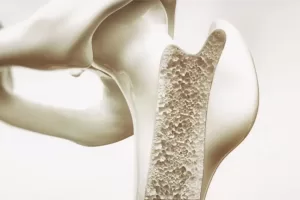Medically Reviewed by Dr Richard Bennett
Last updated on 11.06.2024
Osteoporosis- what causes brittle bones?
Your bones are in a constant state of turnover throughout life- as some bone cells dissolve, others form. Amazingly, this means that every 10 years or so you completely replace most of your own skeleton! However, if for some reason, the loss of bone is greater than the growth of new bone, this can gradually lead to a condition called Osteoporosis, with thinning of the bones and a higher risk of fractures (broken bones). Osteoporosis is sometimes picked up when a person breaks a bone from a low impact injury, and can be confirmed by performing a bone density scan (dexa scan). Whilst Osteoporosis runs in families, there are a number of other risk factors.
Menopause or Amenorrhoea
Women are much more likely to get Osteoporosis than men. When oestrogen levels drop following menopause, this has an effect on bone density. Women who have an early menopause, due to a medical condition or following surgical removal of the ovaries, are particularly at risk. Women whose periods stop for prolonged lengths of time (amenorrhoea), for example due to over-training, weight loss or over-dieting, may also be at risk of Osteoporosis.
Other hormone problems
In men, testosterone gets converted to oestrogen, which helps to maintain bone density. If testosterone is low, this can lead to Osteoporosis. Other hormones that regulate bone density include parathyroid hormone, growth hormone and thyroid hormone. The parathyroid glands are adjacent to the thyroid gland in your neck- if you produce too much parathyroid hormone (hyperparathyroidism), you can lose calcium in your urine. A lack of calcium leads to lower bone density.Low levels of growth hormone (which is made in the pituitary gland) and high levels of thyroid hormone (hyperthyroidism)may also lead to Osteoporosis.
Low Calcium or Vitamin D levels
Calcium is an essential ingredient for bone formation. If you have low calcium, due to a poor diet or due to a medical condition, it can lead to Osteoporosis.
Vitamin D helps your body to absorb and use calcium efficiently. If you have low levels of Vitamin D, for example due to inadequate sunlight exposure or poor intake in your diet, this can lead to reduced bone density.

Being Physically Inactive
If bones are not subjected to regular physical exercise and activity, they get weaker over time. This can simply be due to a sedentary lifestyle, or may be due to a health issue that causes a person to have reduced mobility.
Smoking and alcohol
Smokers tend to have lower bone density than non-smokers. It appears that smoking may have a toxic effect on the bone cells, as well as disrupting how the body uses Vitamin D, calcium and oestrogen. Excess alcohol can also affect bone growth and loss of calcium.
Certain medications can increase the risk of osteoporosis. Steroid medications are particularly likely to cause reduced bone density. Other culprits include medications used to treat Epilepsy.
Other Chronic Disease
Many chronic diseases can lead to Osteoporosis over time. These include Rheumatoid Arthritis, Chronic Kidney Disease, Chronic Liver Disease, Coeliac Disease, Inflammatory Bowel Disease (such as Crohn’s or Ulcerative Colitis), Multiple Myeloma and Lupus. Being either underweight or obese can also be a risk factor for Osteoporosis.
If you’ve had a broken bone (fracture) from a low impact injury, or you are simply concerned about your risk of Osteoporosis, you may require a Dexa scan (bone density scan) and other investigations. Speak to your doctor, who will be able to advise you further.
Further Patient Resources:
Article Resources:
Ewald D. (2012). Osteoporosis: Prevention and Detection in General Practice
Ragucci KR, Shrader SP. (2011). Osteoporosis treatment: an Evidence Based Approach
Getting a Mental Health Care Plan in Australia: Your Guide
Getting a Mental Health Care Plan in Australia: Your Guide Mental health matters—and if you’re feeling overwhelmed, anxious, or down, a mental health care plan can help. But what is it, and how do [...]
UTI Symptoms and Treatment: What You Need to Know
UTI Symptoms and Treatment: What You Need to Know Urinary Tract Infections (UTIs) are common, uncomfortable, and often disruptive. But what exactly are the signs to watch for, and how can you get relief [...]
Free Mental Health Care Plan Online | Bulk-Billed by Qoctor
Free Mental Health Care Plan Online | Bulk-Billed by Qoctor Discover how to get a free, bulk-billed Mental Health Care Plan (MHCP) in Australia through Qoctor's telehealth service. Accessing [...]




